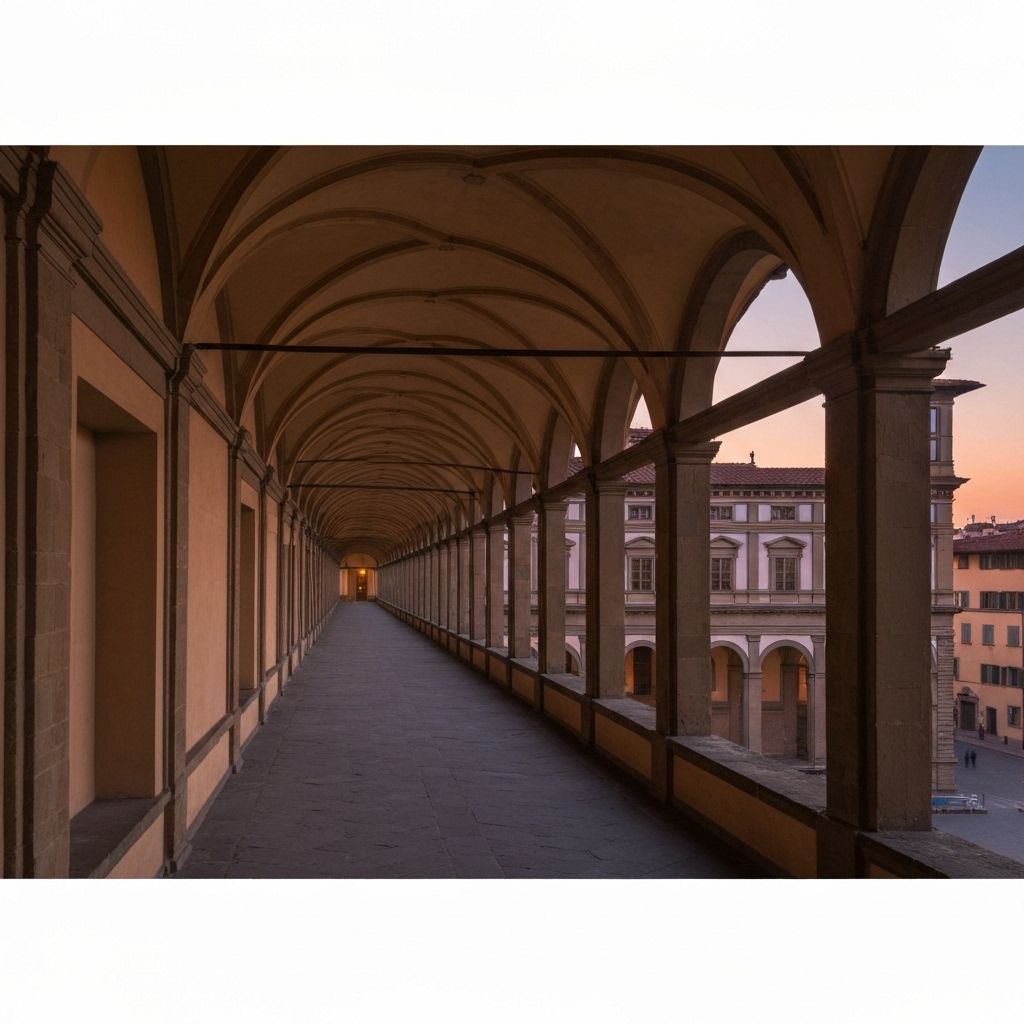Back to what to-see
architecture
The Vasari Corridor: Secret Passage of the Medici
Explore the hidden corridor that connected the Uffizi to Palazzo Pitti, filled with self-portraits and history.
Invalid Date
6 min read
Book Your Uffizi Tickets
Skip the line with official tickets

# The Vasari Corridor: Secret Passage of the Medici
The Vasari Corridor, built in 1565 by Giorgio Vasari, is a fascinating elevated enclosed passageway that connects the Uffizi Gallery to Palazzo Pitti, crossing the Arno River via the Ponte Vecchio. This architectural marvel served as a private route for the Medici family.
## Historical Background
Commissioned by Cosimo I de' Medici for the wedding of his son Francesco to Joanna of Austria, the corridor was completed in just five months. It allowed the Medici to move between their residence and the government offices without mingling with the public.
## Architectural Features
### The Route
- **Length**: Approximately 1 kilometer
- **Starting point**: Uffizi Gallery's second floor
- **Path**: Through the Ponte Vecchio, along the Oltrarno district
- **Endpoint**: Palazzo Pitti's Boboli Gardens
### Design Elements
- **Windows**: Over 100 windows offering unique views of Florence
- **Structure**: Elevated walkway supported by arches and columns
- **Materials**: Local Florentine stone and brick construction
## The Self-Portrait Collection
The corridor houses the world's largest collection of self-portraits, featuring works by:
- **Rembrandt**: Intimate self-examination
- **Velázquez**: Royal court painter's perspective
- **Chagall**: Modern artistic vision
- **Vasari himself**: The architect's own self-portrait
## Visiting Information
### Current Status
The Vasari Corridor is currently closed for restoration but is expected to reopen with limited guided tours. Check the official Uffizi website for updates.
### When Open
- **Tours**: Small groups only (maximum 25 people)
- **Duration**: Approximately 75 minutes
- **Advance booking**: Essential due to limited capacity
- **Special exhibitions**: Rotating displays of the self-portrait collection
## Engineering Marvel
The corridor's construction required innovative engineering solutions:
1. **Bridge integration**: Seamlessly incorporated into Ponte Vecchio
2. **Church passage**: Special arrangement to pass over Santa Felicita
3. **Private access**: Hidden entrances and exits
4. **Structural support**: Minimal impact on existing buildings
## Cultural Significance
The Vasari Corridor represents:
- **Political power**: The Medici's control over Florence
- **Artistic patronage**: Support for Renaissance artists
- **Urban planning**: Integration of private and public spaces
- **Historical continuity**: Connection between past and present
## Conservation Challenges
Maintaining this 16th-century structure presents unique challenges:
- **Weather exposure**: Protection from rain and humidity
- **Structural integrity**: Supporting the weight of visitors
- **Art preservation**: Climate control for the self-portraits
- **Modern safety**: Meeting contemporary safety standards
*The Vasari Corridor stands as a testament to Medici power and Renaissance ingenuity, offering visitors a unique perspective on Florence's history and art.*
Tags
Vasari
Medici
Architecture
Secret Passage
Comments (0)
Leave a Comment
Loading comments...
Book Your Uffizi Tickets
Skip the line with official tickets